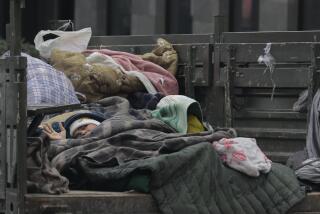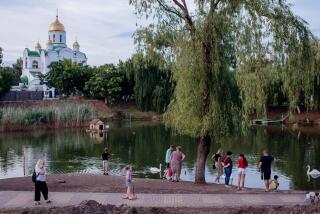Republic of Riches Chafes Under Moscow’s Neglect : Russia: Yakutia is the font of nation’s natural wealth. But citizens gain little from federalism--or hard work.
- Share via
YAKUTSK, Russia — The streets of this remote Siberian city perched on permafrost are not paved with gold, but its long-neglected inhabitants say they should be.
The Republic of Yakutia is the hard-currency engine of Russia’s economy, the heart of its lucrative diamond industry, a wellspring of oil, the mother lode of its staggering riches of gold, platinum, copper and other metals.
But the people who unearth Yakutia’s natural bounty toil in the same Dickensian squalor that pervades mining and industry across the federation’s bleak landscape. They return home each night to the same shabby housing blocks that blight the rest of Russia. They can escape 100-degree summers and winters of 70-below only by engaging in undignified battles for scarce seats on ramshackle planes or the rattling Trans-Siberian railroad that takes six days to reach Moscow.
The only hint of luxury in this primitive republic capital is the Swiss-built President Hotel, where a one-night stay costs twice the monthly salary of the average Yakutian worker.
“I don’t see any gold or diamonds in my life,” harrumphs Valentina V. Kins, a widow with two grown sons who works for the state-run telephone company that has yet to extend its services to her own home. “It certainly isn’t obvious in our day-to-day existence that we are sitting on top of enormous wealth.”
The conspicuous absence of even basic needs, like affordable food and indoor plumbing, has given Yakutians and their leaders cause to accuse the federal government in Moscow of neglecting the goose that lays its golden eggs.
In an era of growing restlessness among Russia’s scattered regions, the discontent evident in Yakutia--twice the size of Alaska and one-sixth of all Russia’s territory--could confront the federal capital with its most costly challenge yet if the dissatisfaction should one day spur the region to market its treasures elsewhere.
“Yakutia has already managed to blackmail the center into granting it more rights than any other region,” says Albion V. Brechalov, a senior official of the Ministry for Minority Affairs and Regional Policy, who coordinates relations between the federal government and the 89 autonomous republics and provinces.
But he concedes that Kremlin bullying of renegade regions, like the brutal war against secessionist Chechnya that has killed 20,000, is as much a threat to the future of Russia as the independence-mindedness of some republics.
“Such a vast country as Russia cannot exist in such boundaries as it has today unless we revert to the totalitarian tactics that were employed in the past or work together to enhance our economic interdependence,” Brechalov says. “We must choose the second option, so that the regions stay in Russia of their own volition.”
A history of common statehood has fostered in Russia an integrated network of governance, transportation, industry and education, which sociologists and social planners believe provides the glue holding the country’s far-flung and fractious components together.
But in an age when jet transportation and telecommunications make contact with the better-developed Pacific Rim states more feasible than reforming indifferent bureaucrats in Moscow, officials have come to fear that rich regions such as Yakutia could opt to abandon Russia.
That it would be cheaper and more efficient to trade Yakutia’s riches through Tokyo or Seoul--both considerably closer than Moscow--is the underlying threat compelling the central government to cede more autonomy to the republic.
Vasily N. Ivanov, head of the Sakha People’s Committee representing the indigenous population of Yakutia, insists autonomy is the only hope for improving life here.
“The dictatorship of ideology is over. We are free people now,” says the native Sakha, or Yakut, of the Turkic-language ethnic group that has inherited title to the republic despite being outnumbered by Russians.
Salaries paid from Moscow for resource extraction here are higher than elsewhere in Russia because of a Soviet-era bonus system for hardship regions. But the differential has fallen far behind spiraling prices for food, energy and clothing that must be imported through the federal trade structure directed by Moscow, 4,000 miles away.
Ivanov repeats the lament of many regional leaders in accusing the Kremlin of scaring off needed foreign investment with its endless series of power struggles and crises--another factor in Yakutia’s desire to take more responsibility for its affairs.
Yakutian and federal officials in June agreed on a new constellation of income- and power-sharing agreements that both sides hailed as an acceptable framework for managing the republic in the short term.
But fear of resurgent Russian nationalism and heavy-handedness with the provinces pervades Yakutia as much as it does regions where the disputes with Moscow are more ethnic than economic. With threats of a federal rescinding of autonomy agreements emanating from Moscow, regional officials have begun to worry that a return to federal subjugation could spur revolts.
“We have some worries about the Chechnya syndrome, and we have resolutely condemned Moscow’s handling of that crisis,” Ivanov says. “But people from the north are different. Yakuts are very tolerant. We have never fought a war with anyone.”
In the four years since Yakutia gained sovereignty after the Soviet Union disappeared, local authorities have dramatically expanded the republic’s role in the $2-billion-a-year diamond industry to create cutting and polishing workshops, marketing enterprises and prospecting services.
“In the past, everything was directed from the center. All we did here was the physical excavation,” says Pyotr D. Kirilin, head of the Yakutsk office of the Almazy Rossiya-Sakha joint venture that dominates the diamond trade.
Like most Yakutsk residents, Kirilin acknowledges that living conditions reflect little of the region’s natural wealth, even with local authorities now masters of their own destinies. But he contends that Yakutia has fared better than regions less endowed.
“Everywhere else in Russia, people have suffered as much as a 30% slump in economic performance, whereas we managed a growth tendency last year, largely as a result of the diamond industry. It would be hard to find any other part of Russia that has achieved such progress,” he says.
Yakutia’s prosperity, measurable only against the devastation elsewhere, has emboldened the republic’s authorities to take a tougher stand with the Kremlin.
Republic President Mikhail Y. Nikolayev has wrested acknowledgment from Moscow that Yakutia “owns” its natural resources and voluntarily markets them through the center. And Russian nationalist saber-rattling over the future of autonomy agreements prompts stern warnings from local kingpins that Moscow needs Yakutia more than the other way around.
“If Russia doesn’t treat its subjects with dignity, Russia won’t be able to survive,” says Kirilin. “I hope no one is foolish enough to start sawing away at the branch on which we are all sitting.”
Some politicians outside Nikolayev’s ruling circle contend that Yakutia’s intoxication with autonomy will wear off with time and that this region, like most others currently distancing themselves from Moscow, will recognize the logic of nurturing the ties that bound the Soviet Union.
“The tendencies for re-integration will inevitably cause restoration of federal power. This is a law of nature--not my subjective desire but an objective necessity,” says Artur N. Andreyev, head of the Yakutian Communist Party.
He points to the spread of ethnic and secessionist conflicts throughout Europe and predicts that “this languid World War III” will wear down Russia’s own separatists.
“All this talk of the ‘sovereignty’ of Yakutia is just political bluff. We couldn’t even manage our internal economy if we closed ourselves off from the rest of Russia,” Andreyev says. “And what about defending the republic? Even if we mobilized everyone from infants to the elderly, we couldn’t patrol our own borders.”
But Andreyev swims against a rising tide of desire for autonomy among Yakutia’s 1.1 million people. Those in power here want to be able to deal directly with Pacific Rim trade partners instead of conducting business through the inaccessible, corrupt and often uninterested bureaucracy in Moscow.
First Deputy Prime Minister Alexei A. Tomtosov complains that many foreign trade deals proposed to Yakutia founder because of the disorderly federal regime.
“The instability of Russia as a whole scares away the larger and more serious investors,” says Tomtosov. “There are so many buccaneers [in Moscow] looking to fish in troubled waters, trying to make a quick buck while everything is so unsettled. These people are incapable of competing on normal international business terms.”
Federal authorities, like those from the powerful Russian Committee on Precious Gems and Metals, still control all licenses and quotas for mining activity.
“The state monopoly is being maintained, but it is becoming more democratic,” insists Yevgeny M. Bychkov, federal czar of natural resources as chairman of the gems committee.
Moscow has the final say in decisions on extraction levels and foreign sales, but Bychkov argues that the benefits of doubling diamond production over the past few years can be felt in the region from which the valuables flow.
“In the last three years, diamond production has seen 7,000 new jobs created,” Bychkov says.
A reconciliation of federal and Yakutian political forces may be getting encouragement from a joint battle against the De Beers diamond-marketing cartel, as both Russian parties want a bigger share of the global pie in exchange for renewal of a five-year sales agreement expiring in December.
Bychkov says Moscow and Yakutsk have joined forces and worked out all points of conflict with the exception of “a few trifles.”
“It is quite natural for there to be some difficulties, as everyone always wants more for himself,” Bychkov says philosophically. “Of course, it’s more complicated now than, say, 10 years ago, when everything was decided by the center. Friction has increased, but we are learning to deal with this.”
Meanwhile, on the steamy streets of Yakutsk, workers bemoan the slow pace of improvement in the harsh conditions that define Siberian life.
“I’m not satisfied with what has been done with our money. It is mostly spent on making life more comfortable for foreign investors,” says architect Lena Romanova. “The republic leadership should be taking care of domestic needs first.”
A new maternity clinic is expected to open in the fall, and there have been some improvements in health care and education, concedes the 35-year-old working mother.
“But we’re just insects in the eyes of those in power, whether here or in Moscow,” she says resignedly. “We don’t enjoy the fruits of our labor. We’re like shoemakers made to go barefoot.”
More to Read
Sign up for Essential California
The most important California stories and recommendations in your inbox every morning.
You may occasionally receive promotional content from the Los Angeles Times.











